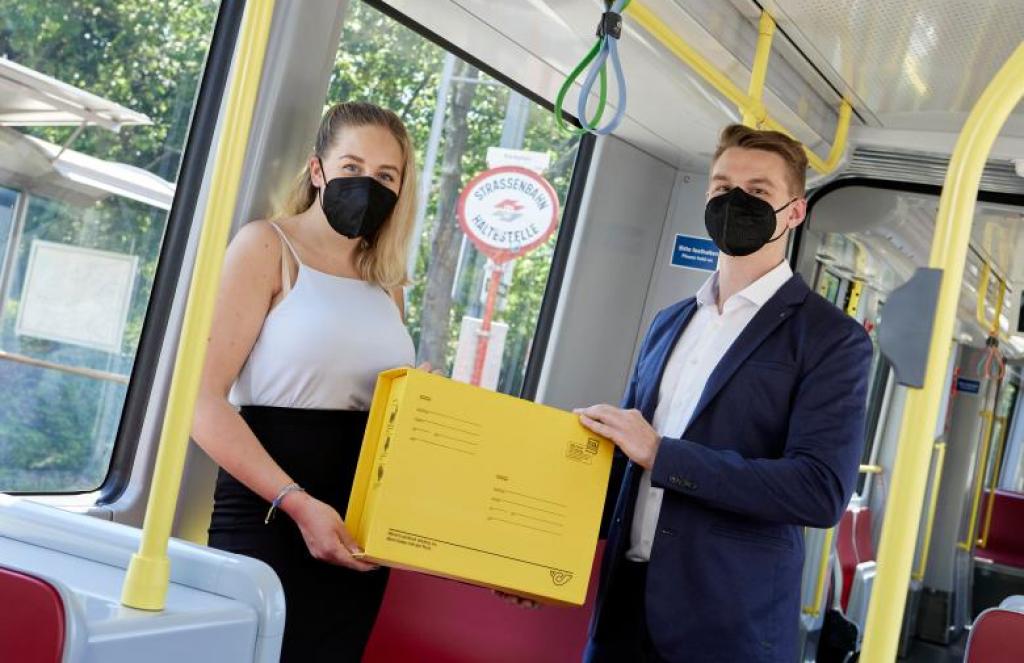Thessaloniki gets ready for its metro launch in November
The underground rapid transit lines have been under construction for almost two decades due to various project delays
 TheMayor.EU logo
TheMayor.EU logo 
Julia Komarek (Project Manager Wiener Linien) and Matthias Hayek (Fraunhofer Austria), Source: Robert Peres / Wiener Linien
New project developed by the city’s tram operator calls for a mixture of deposit boxes and commuters moving the parcels through the city
This week, Wiener Linen, Vienna’s public tram operator announced that it would start working on a project to decentralise package delivery throughout the city. The project itself envisions citizens taking parcels with them through the extensive tram network.
The project aims to decarbonise a new rising source of carbon emissions, last-leg delivery services. It would also alleviate traffic and help delivery companies do the least cost-effective part of their job – going door to door.
Since the start of the pandemic, parcel delivery has been gaining momentum at a breakneck speed, as people around the world found themselves stuck at home and unable to go shopping.
Most shopping moved online and delivery companies started making billions of daily trips to bring packages right to our doorsteps. In Vienna alone, experts estimate that in 2021, there were 113 million ordered parcels.
This, however, creates a logistical issue, as well as an emissions issue for cities, bringing around the question: ‘How to decarbonise last-leg delivery?’ Two of the main solutions that authorities have started implementing revolve around replacing cargo vans with cargo bikes, and setting up parcel boxes in residential areas to minimise travel times from door-to-door trips or some combination of both.
Yet, Vienna is pondering a different approach, that wants to see if delivery within an urban area could be done via public transport and a voluntary citizen solidarity system. This means that regular people will be able to take parcels during their daily commutes and move them across the city.
Simply put, the project is ways off at the moment, as Wiener Linen officials say that they can start a test run in 2024 at the least. However, they have already carried out feasibility studies, as well as research on how willing the public is to participate in this initiative. After all, according to an official statement, people would carry strangers’ parcels on public transport, during their commute.
Here is how the system would work: Both final stops of a tram line should have larger deposit boxes that store the bulk of the parcels. People, who want to participate in the delivery system would be able to check out a box, using a QR code.
Then, with the help of an app, they will know where the box is supposed to be dropped off. Ideally, the app would plot a convenient location based on that person’s predetermined route. Then, when they reach the specific stop, people will be able to drop off the parcel at a smaller drop-box, located at the tram stop itself.
Moreover, the parcel boxes themselves will be powered by solar panels, meaning that they will not have to connect to the grid, making them very easy to deploy.
Additionally, transport authorities also specify that this would not necessarily cut into logistics companies’ business, as they put it: “Someone still needs to drop off the parcels at the starting off points.”
Are you between 15 and 29 years old? Take a moment to complete a short survey on youth empowerment on this link.

The underground rapid transit lines have been under construction for almost two decades due to various project delays

Now you can get your wine in Talence by paying directly in Bitcoin

That’s because the state has to spend money on updating the railway infrastructure rather than subsidizing the cost of the popular pass

Rethinking renewable energy sources for the urban landscape

The examples, compiled by Beyond Fossil Fuels, can inform and inspire communities and entrepreneurs that still feel trepidation at the prospect of energy transition

Now you can get your wine in Talence by paying directly in Bitcoin

The 10th European Conference on Sustainable Cities and Towns (ESCT) sets the stage for stronger cooperation between the EU, national and local level to fast track Europe's transition to climate neutrality.

At least, that’s the promise made by the mayor of Paris, Anne Hidalgo

The underground rapid transit lines have been under construction for almost two decades due to various project delays

At least, that’s the promise made by the mayor of Paris, Anne Hidalgo

Hostal de Pinós is located in the geographical centre of the autonomous region

Despite its church-y name, the district has long been known as the hangout spot for the artsy crowds

Urban dwellers across the EU are having a say in making their surroundings friendlier to people and the environment.

Forests in the EU can help green the European construction industry and bolster a continent-wide push for architectural improvements.

Apply by 10 November and do your part for the transformation of European public spaces

An interview with the Mayor of a Polish city that seeks to reinvent itself

An interview with the newly elected ICLEI President and Mayor of Malmö

A conversation with the Mayor of Lisbon about the spirit and dimensions of innovation present in the Portuguese capital














